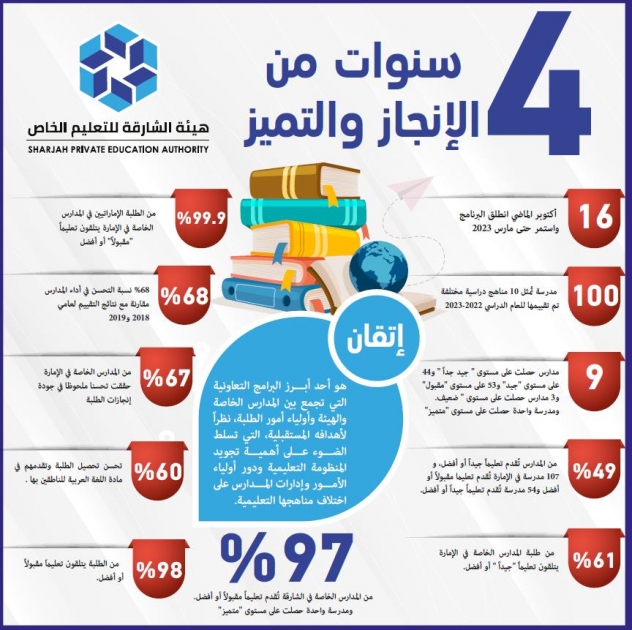
Sharjah Private Education Authority Announces Remarkable Improvement in School Performance as Revealed by its 'Itqan' Programme
- 68% improvement in school performance compared to evaluation results for 2018 and 2019
- 61% of private school pupils receive a “good” or better education.
- One school achieves “outstanding” and 9 “very good”, 44 schools “good”, 53 “acceptable” and 3 schools “weak”.
The Sharjah Private Education Authority (SPEA) today unveiled the encouraging results of its 'Itqan' programme, a qualitative initiative aimed at enhancing school performance across the emirate.
The programme evaluated 110 out of 127 private schools in the emirate, which collectively educate 181,175 pupils, including 21,995 Emirati pupils.
Results of the study demonstrated that 107 schools, constituting 97% of private schools in the emirate, provide acceptable or better education.
Furthermore, 54 schools, representing 49% of those evaluated, provide good or better education.
.jpg)
The breakdown of the results revealed one “outstanding” school, nine “very good” schools, 44 “good” schools, 53 “acceptable" schools, and three “weak” schools.
Importantly, no school was ranked “very weak.”
The study also highlighted that 110,954 pupils who make 61% of the total pupil population in private schools, receive “good" or better education, while 177,709 pupils, a whopping 98%, receive at least an acceptable level of education.
Among Emirati pupils, 14,003 who represent 64% of all Emirati pupils across Sharjah private schools, receive a “good” or better education, and nearly all (21,987 out of 21,995) receive an “acceptable” or better education.
The results indicate a significant improvement of 68% in school performance compared to previous evaluations in 2018 and 2019.
The number of schools providing good or better education has grown from eight to 53, while those offering acceptable or less education has dropped from 94 to 56.
Pupils' achievements quality has also improved in 67% of private schools, compared to 8% in the previous session.
Furthermore, proficiency in Arabic for native speakers improved in 60% of the schools.
The results also underscored that quality education is not limited to high-cost institutions.
Thirty-four private schools, charging average annual fees of Dh20,000 or less, provide good or better education.
This includes 22 medium-fee and 12 low-fee schools, demonstrating their commitment to continuous improvement and development.
Notably, 17 schools were not included in the evaluation due to not meeting the criteria, such as being in their second year of operation.
The results mark a significant milestone for the SPEA in its continuous commitment to enhance the quality of private education in Sharjah.
However, SPEA which is sharing the results to celebrate this remarkable progress, emphasised the need for continuous support, professional development programs for educators, and regular review visits to schools achieving “acceptable” or lower levels to ensure future improvement.
It said that the “Itqan” program which was first launched in October last last year and lasted until March this year, evaluates schools on six criteria.
These include quality of pupils' achievements, personal and social development of pupils and innovation skills, quality of teaching and evaluation processes, curriculum, quality of care, guidance, and support provided to pupils, and the quality of school leadership and management.


























